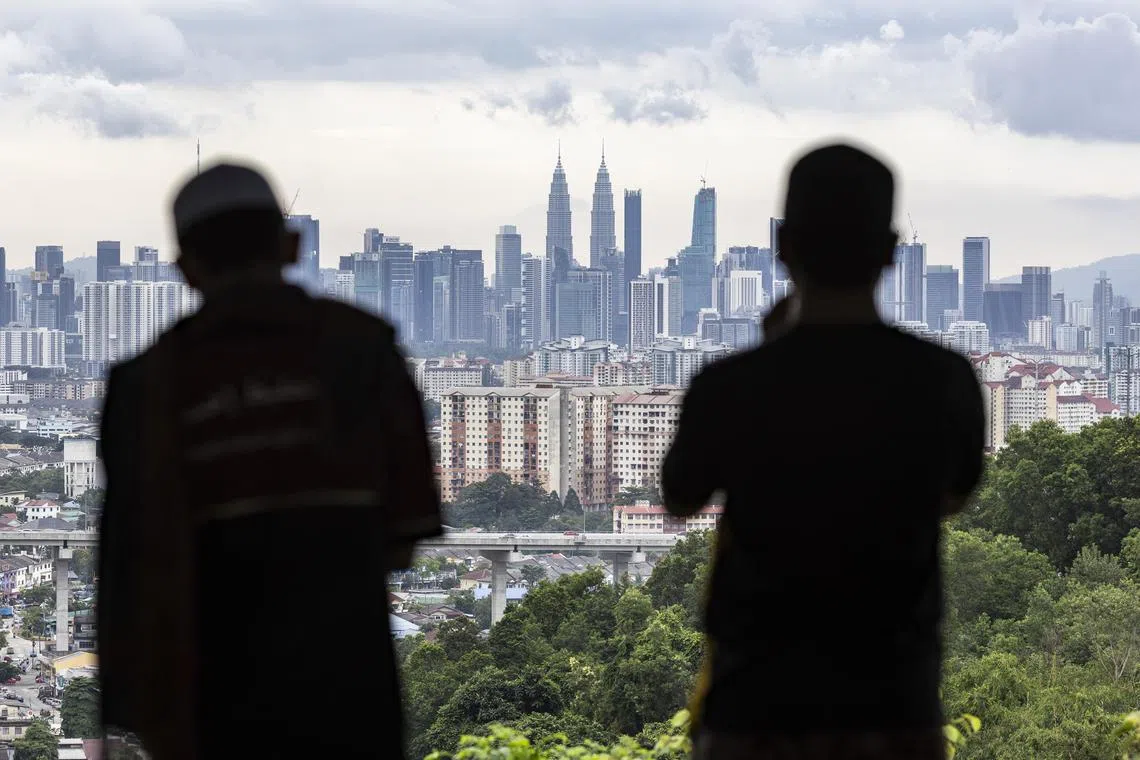Coffee trails, dark tourism: Malaysia woos tourists with trending escapades
Sign up now: Get ST's newsletters delivered to your inbox

Malaysia would promote not just the capital city Kuala Lumpur but also lesser-known locales that feature unique culture, heritage and possibilities for adventure.
PHOTO: BLOOMBERG
Follow topic:
PUTRAJAYA - The evolving desires of travellers have led to Malaysia tapping trends that include coffee trails, houseboat holidays and motorhome adventures.
Other escapades awaiting intrepid tourists include archaeological experiences and dark tourism, which includes visiting places where some of the darkest events of human history unfolded.
Tourism Malaysia director-general Manoharan Periasamy said that besides introducing these novel experiences, Malaysia would also enhance its existing niche tourism, which is witnessing an upward trend.
“These include bird watching, luxury camping (glamping), fishing excursions, hiking expeditions, culinary tours and specially curated packages for weddings, honeymoons and wellness retreats,” he told The Star.
To diversify its reach, Mr Manoharan said Malaysia would promote not just capital city Kuala Lumpur but also lesser-known locales that feature unique culture, heritage and possibilities for adventure, as well as culinary and agro-based tourism.
“The broader strategy is to position Malaysia as a multifaceted destination for health and wellness, luxury travel and vibrant festivals and events,” he said.
This could foster urban and rural revitalisation, Mr Manoharan added.
To effectively market these diverse experiences, he said Tourism Malaysia – which is the country’s tourism promotion board – was set to roll out strategic initiatives such as joint programmes and partnerships with key tourism stakeholders to strengthen marketing campaigns.
“The aim is to extend the promotional reach and maximise the impact of our efforts.”
Additionally, Mr Manoharan said public relations activities were also on the agenda to enhance media coverage and visibility for Malaysia’s tourism sector.
“Familiarisation trips are being organised to host media and travel industry professionals so that they can experience Malaysia’s offerings first hand.
“This move is expected to generate buzz and drive interest in Malaysia as a travel destination,” he said.
Tourism Malaysia is also focused on delivering seminars and workshops aimed at equipping industry players with the necessary skills to offer top-notch experiential tourism products.
He also said participation in trade exhibitions and consumer tourism fairs would further support the effort to bring Malaysia’s multi-dimensional tourism offerings to the global stage.
At the heart of these endeavours is the “Malaysia Truly Asia” brand, now concentrated on sustainable and experiential tourism.
“The brand is set to incorporate dynamic sub-brands, showcasing the country’s nature-based adventures, cultural richness, shopping hot spots, wellness sanctuaries and eventful wonders, all reflecting the diverse essence of Malaysia,” he said.
Mr Manoharan said Tourism Malaysia was in the midst of creating a Travel Malaysia super app to provide tourists with a hassle-free, cashless journey.
He added that this initiative was supported through a partnership with Mastercard and would integrate shopping, exploration and touristic engagement into one platform.
Mr Manoharan said the adoption of virtual and augmented reality allows for immersive marketing campaigns and interactive digital brochures, offering potential travellers a virtual experience of Malaysia’s treasures.
Meanwhile, Mr Manoharan said digital nomads are increasingly drifting towards Malaysia due to its affordable cost of living, incentives for remote workers and low inflation rates.
“They can travel and work remotely across various locations in Malaysia while having access to stable broadband connectivity and other facilities and services,” he said.
He said “workation” (working vacation) and “bleisure” (business and leisure) had gained popularity since the introduction of DE Rantau, Malaysia’s digital nomad programme, in October 2022.
“DE Rantau has benefited both local talents and foreign nomads by creating a vibrant ecosystem that supports the nomadic lifestyle,” he said.
DE Rantau was first launched in Penang as one of the Malaysia Digital Catalytic Programmes to make the country the preferred digital nomad hub to promote digital professional mobility and tourism.
The pass allows digital nomads to stay and work in Malaysia for up to 12 months, with an additional year when renewed.
Alongside this exclusive pass, digital nomads are also offered services during their stay in the country.
Malaysia targets to attract some 80,000 digital nomads by 2025.
The programme is expected to inject some RM4.8 billion (S$1.37 billion) into the local economy.
As at June 13, 2024, DE Rantau has received 3,218 applications, with 1,506 of them approved.
The applicants come from 78 countries, with the top five being Russia, Pakistan, Britain, Japan and Australia.
The average annual income of these approved digital nomads is US$69,000 (S$93,100), with the majority possessing skills in software development, digital marketing, artificial intelligence and machine learning.
A 2023 year-end survey revealed that 40 per cent of approved applicants are in Malaysia with their families, which impacts their spending on tourism, education, food, accommodation and transportation.
Mr Manoharan said Malaysia is expected to see a proliferation of digital nomads, augmenting the existing global network of remote workers and complementing those in neighbouring regions.
He believes there will be a mutually beneficial exchange of knowledge and skills between these global talents and Malaysian professionals.
There have been various reports indicating Malaysia’s popularity with digital nomads.
According to Remote, a global human resources platform, Kuala Lumpur made a big leap from 84th place in 2022 to the 22nd spot in 2023 in its list of Top 100 destinations for remote work.
Malaysia was ranked by the nomadlist.com platform as the number one most preferred country by digital nomads in December 2023. THE STAR/ASIA NEWS NETWORK

